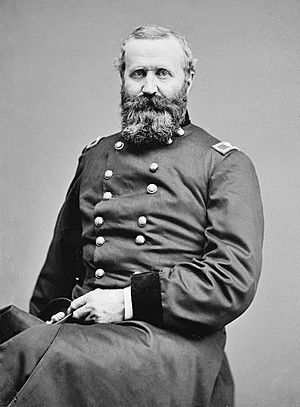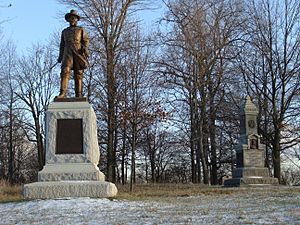Alexander Hays facts for kids
Quick facts for kids
Alexander Hays
|
|
|---|---|

Brig. Gen. Alexander Hays
|
|
| Nickname(s) | "Fighting Elleck" |
| Born | July 8, 1819 Franklin, Pennsylvania |
| Died | May 5, 1864 (aged 44) Battle of the Wilderness, Virginia |
| Place of burial |
Allegheny Cemetery, Pittsburgh, Pennsylvania
|
| Allegiance | United States of America Union |
| Service/ |
United States Army Union Army |
| Years of service | 1844–1848, 1861–1864 |
| Rank | |
| Unit | Regular Army
|
| Commands held | 63rd Pennsylvania Infantry |
| Battles/wars | Mexican–American War American Civil War |
Alexander Hays was a brave general who fought for the Union Army during the American Civil War. He was born on July 8, 1819, and sadly, he died in battle on May 5, 1864, during the Battle of the Wilderness. People knew him as "Fighting Elleck" because he was so courageous.
Contents
Early Life and Career
Growing Up in Pennsylvania
Alexander Hays was born in Franklin, Pennsylvania. His father, Samuel Hays, was a politician and a general in the Pennsylvania militia. This meant his father was part of a group of citizens trained for military service.
Becoming a Soldier
Alexander first studied at Allegheny College. Later, he transferred to the United States Military Academy (West Point). He graduated in 1844. He was 20th in his class of 25 cadets.
Some of his classmates also became famous Civil War generals. These included Alfred Pleasonton and Winfield Scott Hancock. Hays also became very good friends with Ulysses S. Grant. Grant later became a famous general and President of the United States.
First Military Service
After West Point, Hays became a second lieutenant in the 8th U.S. Infantry. He fought in the Mexican–American War. He was recognized for his bravery in a fight near Atlixco. In April 1848, he left the army and went back to Pennsylvania.
Life After the Army
Back in Pennsylvania, Hays tried different jobs. From 1848 to 1850, he worked in iron manufacturing. He even went to the California gold fields hoping to find gold, but he wasn't successful.
He then worked as an assistant engineer for a railroad until 1854. From 1854 to 1860, Hays was a civil engineer in Pittsburgh. He helped plan several bridge building projects in the city.
Civil War Service
Joining the Union Army
When the American Civil War began, Alexander Hays rejoined the army. He became a colonel, leading the 63rd Pennsylvania Volunteer Infantry Regiment. His soldiers admired him and said he was "as brave as a lion."
Early Battles and Injuries
Hays and his regiment fought in many important battles. These included Yorktown, Williamsburg, Seven Pines, Savage's Station, and Malvern Hill.
During the Seven Days Battles, Hays showed great courage. He led a bayonet charge to help his brigade retreat safely. For this brave act, he was promoted to lieutenant colonel. A month later, he had to take sick leave. He suffered from partial blindness and paralysis in his left arm due to battle injuries.
Return to Command
Hays returned to lead the 63rd Pennsylvania during the Northern Virginia campaign. He led another charge in the Second Battle of Bull Run. In this battle, he was badly wounded in the leg. While he was recovering, he was promoted to brigadier general in September 1862.
In early 1863, Hays was given command of a brigade in the defenses of Washington, D.C.. His brigade later joined the main Union army, the Army of the Potomac.

Hero at Gettysburg
During the Battle of Gettysburg, Hays was put in charge of the Third Division. His division played a key role in defending the Union line on Cemetery Ridge. On July 3, 1863, his division bravely fought off a major Confederate attack. They even counterattacked the enemy!
Hays was very excited after the victory. He kissed his aide and rode along his division's line, dragging a captured Confederate flag in the dirt. For his amazing efforts at Gettysburg, Hays was promoted to colonel in the regular army. He continued to lead his division in other battles like Auburn and Mine Run.
Final Battle and Death
Hays's last big battle as a division commander was at Battle of Morton's Ford in Virginia in February 1864. This battle resulted in many casualties for his division.
In early 1864, the Army of the Potomac was reorganized. Hays was placed in command of a brigade, which meant he no longer led a whole division. He was sad about this but was happy to serve under his friend, General David B. Birney.
During the Overland Campaign, Alexander Hays was killed in action. He was struck in the head by a bullet near the Brock and Plank Roads in the Wilderness.
He was buried in Allegheny Cemetery in Pittsburgh, Pennsylvania. Years later, his friend Ulysses S. Grant, who was running for president, visited Hays's grave and openly cried.
Honors
Many places and groups were named to honor General Alexander Hays:
 | Emma Amos |
 | Edward Mitchell Bannister |
 | Larry D. Alexander |
 | Ernie Barnes |

